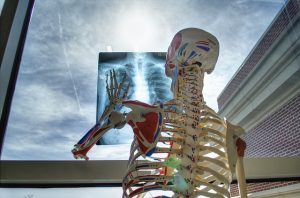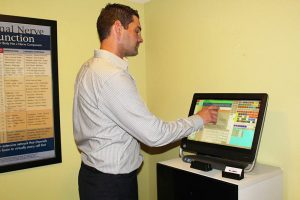Specific foods aren’t the only reason why your digestion might be in trouble – one of the other potential factors is posture.
If you think about the way most people sit all day, it’s just as evolutionarily weird as what they eat. Human bodies aren’t adapted to hunching over in a chair with our necks sticking forward all day. Our circulatory systems and muscle structures just aren’t built for it. When we try to cram our bodies into that mold, we get all kinds of problems, including back pain, mobility issues, and less-obvious consequences like digestive problems.
It shouldn’t be any surprise that posture can affect the way you digest food. After all, your posture determines how easily blood can flow around your body, and digestion requires a lot of blood flowing to your gut – if something is impairing that blood flow, then your digestion will be sluggish and you’ll get that “brick in your stomach” feeling. If you’ve ever tried to get up and go for a run too soon after eating, you know the uncomfortable consequences of getting the blood flowing away from your stomach too fast.
“Improving posture” in this sense doesn’t mean sitting up straight by your grandmother’s standards or balancing books on your head. It means holding your body in a way congruent with your basic physiological processes. And you don’t have to guess about the fact that this is important, either – there are actually studies on it. Posture after eating has been found to help with everything from carbohydrate intolerance (e.g. FODMAPs intolerance) to IBS and bloating? Here’s the rundown.
Posture and Carbohydrate Malabsorption
Carbohydrate malabsorption, including FODMAPs sensitivity and lactose intolerance, is a major cause of digestive problems. Some of it has to do with the gut flora and various other factors, but posture also matters. A group of scientists from Japan has been studying the effect of postprandial posture (that’s the way you sit or stand after eating) on digestion:
- In this study, the researchers compared lying down to sitting up after a meal. They found that the women who lay down digested their food more slowly and had much less malabsorption. Meanwhile, the women who sat up had significantly more malabsorption.
- Another study by the same group found a similar result for milk sugar (lactose): lying down improved digestion of lactose and reduced malabsorption compared to sitting up.
The author’s hypothesis to explain this was that lying down essentially helped flip one of our oldest evolutionary switches by shifting the subjects out of “fight or flight” mode and into “rest and digest” mode. “Fight or flight” mode is exactly what it says on the tin: your blood is rushing to your muscles and your stress hormones are high to maximize your strength and reflexes. By contrast, in “rest and digest” mode, blood is flowing to your digestive system, which gives your body a hand up with the extremely energy-demanding process of digestion.
Chronic stress (always being in fight-or-flight mode thanks to your commute, your lousy boss, your credit card bills, your ever-growing to-do list…) is one of the big evolutionary mismatches in the modern world: we weren’t physiologically built to be in “fight or flight” mode all the time, and digestion is just one of the many casualties.
What the researchers found is that posture might be one way to cue our bodies to shift from fight-or-flight to rest-and-digest, and alleviate some of the modern chronic stress burden, with the ultimate result of improving digestion. This suggests that if you have problems with FODMAPs or lactose intolerance, lying down and relaxing after a meal or maybe even just reclining might help improve your digestion. In fact, if it really is just about the “rest and digest” mode, then just staying calm during and after your meal (no lunch at your desk, no eating in a rush) could possibly do the trick even without the posture.
Posture, Gas, and Bloating
The studies above suggested that posture might be more of a cue to your body to turn off the stress hormones and focus on digestion – this would help with malabsorption because the more resources (blood flow, energy…) you can dedicate to digesting your food, the better you’ll be able to do the job. But it’s not all about cueing! Posture can also physically help with bloating and discomfort by either strengthening or weakening abdominal muscles, particularly the diaphragm.
For example, a study found that patients with Irritable Bowel Syndrome who complained of bloating and gas had unusually relaxed oblique abdominal muscles, possibly caused by unusual diaphragm contractions. For people who don’t get bloating, the diaphragm relaxes when their stomach is full, which creates more space in the stomach. For people who do get bloating, the diaphragm contracts, which pushes everything in the stomach into a smaller space, causing the bloating.
Patients can learn to control these muscular responses using a technique called biofeedback, which dramatically helps to resolve the bloating. Specifically, they were told to:
- Relax the diaphragm
- Increase the activity of the front abdominal muscles, especially when they breathed out.
Once again, this is a modern problem – we just aren’t built to slouch around in front of our computers all day. So “good posture” in this case is really just correcting a mismatch between what our bodies are adapted to (holding our torso upright using our own abdominal muscles) and the typical modern pattern (slouching and letting the chair do it for us).Poor posture comes into this because a slouched or hunched-over posture constricts the movement of the diaphragm and weakens the abdominal muscles. You can see this for yourself if you slump over and then try to do diaphragmatic breathing: it doesn’t work. Sitting and standing correctly, on the other hand, gives your diaphragm space to move properly.
Gas trapped in the intestines can cause bloating and discomfort; in this study, the researchers found that standing upright with good posture was the best position for passing the gas and getting rid of the discomfort, thanks to the way the upright position triggered gas propulsion in the gut.
The upshot: if you have problems with gas and bloating, practicing good posture can help by keeping your core muscles strong and letting your diaphragm do its thing. Learning to do “belly breathing” or diaphragm breathing might even be able to help you train your diaphragm to relax when your stomach is full, like the patients in the biofeedback study.
We’re also not built to digest our food under certain conditions, like constant, chronic stress or computer-focused postures that compress our bodies into weird positions. Digestion doesn’t end when you swallow: paying attention to your posture can pay off further down the road. Taken all together, here’s what the studies above suggest may be helpful:
- Before you eat, try some quick stretches to release any tension in your body and help get out of “fight or flight” mode if you’re in it. While you eat, pay attention to your body; don’t hunch over your food with your shoulders tensed and body language that says “I’m ready to fight a tiger:” your body might just take it literally! Maybe try lying down or relaxing completely after eating if you’re having a strong reaction to something.
- Practice sitting and standing with good posture to strengthen your diaphragm and core muscles and prevent bloating. Don’t slump over in your chair all day. In fact, if you can get out of the chair, that’s even better! Maybe try learning diaphragm breathing so you can have even more control over the muscle responses.
Various yoga poses (particularly spinal twists) may also be helpful, although there’s not a lot of scientific evidence for specific poses having specific effects. But if nothing else, yoga is also great for relaxation and reducing stress, and it has shown some benefits for IBS, so it can’t really hurt.

 At Jones Family Chiropractic we offer in-house x-rays as a convenience to our patients so they don’t have to be referred out to another location.
At Jones Family Chiropractic we offer in-house x-rays as a convenience to our patients so they don’t have to be referred out to another location. Jones Family Chiropractic utilizes a state of the art software system that assists with all aspects of chiropractic care. Analysis, results, treatment schedules and progress are all kept in our system. Each time you visit us your private and secure patient history is available for you and Dr. Jones to review and discuss.
Jones Family Chiropractic utilizes a state of the art software system that assists with all aspects of chiropractic care. Analysis, results, treatment schedules and progress are all kept in our system. Each time you visit us your private and secure patient history is available for you and Dr. Jones to review and discuss. Complimentary 15 Minute Consultation*
Complimentary 15 Minute Consultation*